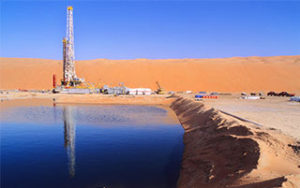Low oil prices are taking a toll on every oil producing country, including those fighting tooth and nail to squeeze other producers out. Saudi Arabia’s oil price wars with high cost producers in North America and elsewhere, are forcing the kingdom to slash one third of projected project expenditure. This comes at a time in which its leadership is actually trying to diversify its economy away from oil, making the decision somewhat confusing.
This announcement comes after Saudi Arabia declared it will sell a 5% stake in state owned oil giant Aramco, the biggest oil company in the planet. This adds to the confusing kind of shock therapy that the kingdom’s leaders are recurring to in order to diversify their economy. These moves may also show that Saudi leadership does not foresee an oil price rally in the near future.
It wouldn’t make any sense to sell a 5% stake in Saudi Aramco while oil prices are at current levels otherwise. Nevertheless, slashing infrastructure budgets might hinder the country’s ability to diversify its economy. The two moves – one to reduce spending on infrastructure and the other to sell a stake in the state owned Oil Company when oil prices are subdued – do not seem to be consistent with the goal of diversifying the economy.
In the meantime the conclusions that investors might make following these moves, could be that oil is in fact headed for a protracted bear market. The selling point of Saudi Aramco with WTI around the $45 USD a barrel mark, coupled with the recognition that state budgets in the kingdom must be slashed in order to keep the country’s finances in order in the medium term, signal that the current price of oil is near its short term peak according to Saudi calculations. Otherwise, the kingdom will not be selling a stake in its crown jewels short, nor would it be slowing the pace at which it seeks to diversify its economy.
This information, coupled with the consistent failure of the OPEC + Russia meetings to cap production in order to prop oil prices, may indicate that oil is in fact headed for a drop in the immediate future. In the meantime, Saudi Arabia’s economy, as well as that of all the other major producers that depend on black gold to fuel their economies, will face a long period of anemic growth. This could further hinder their efforts to diversify their economy and pull away from the ailing oil industry. The fact that these countries are in the midst of this conundrum after enjoying high oil prices for a long period of time, highlights their blunders and their failure to adapt to a changing world economy. Saudi shock therapy thus, has a fair chance of producing yet another such failure.





